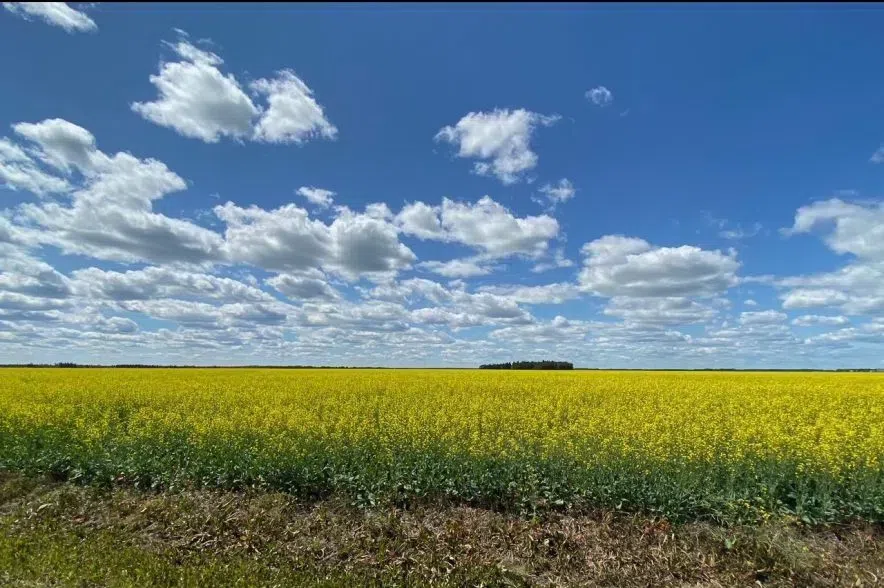Farmers in Saskatchewan are already feeling the pinch after China slapped 100 per cent tariffs on Canadian canola oil and other products.
Lee Stanley, who farms near Gainsborough in the southeast corner of the province, shared his thoughts on the tariffs during an appearance on the Greg Morgan Morning Show.
Read More:
- Canola tariffs hit hard as AgriStability program falls short: Sask Oilseeds
- Extra snow welcomed by Sask. farmers ahead of growing season
- Retaliatory Chinese tariffs on canola oil causing uncertainty in Sask.
“Uncertainty is the big word right now,” Stanley said.
Canada recently imposed 100 per cent tariffs on electric vehicles from China, leading China to retaliate with its own tariffs on canola, peas, pork and some seafood products.
Stanley said this is the second time canola tariffs have left farmers caught in political crossfire.
“Both times the western Canadian farmer has to pay this, and has to suffer the consequences,” Stanley said.
Listen to the full interview, or read the transcript below:
The following questions and answers have been edited for length and clarity.
GREG MORGAN: Has the winter has been kind to you? Is everything going all right? Looking out your window, are all the moisture levels in good shape?
STANLEY: Well, sorry to disappoint, but in this corner we haven’t been getting very much. We are pretty dry down here.
Really? Are the dugouts not even faring well?
STANLEY: It didn’t really change a whole lot from last fall. We did have a bit of snow cover, but what we had is gone and it soaked right in.
On top of that, I bet like many of your fellow farmers (you’re) extremely frustrated right now with China after slapping a 100 per cent tariff on Canadian canola oil, right?
STANLEY: That’s true. Uncertainty is the big word right now, but it seems like no market likes uncertainty and we have a lot of uncertainty.
The federal government moved to increase the cap on the AgriStability support program. It doesn’t seem to be going far enough to help – or does it? Have you looked into the latest on what they’re saying there?
STANLEY: Well, to contrast it to their response to the auto industry, Donald Trump has put the tariffs on the Canadian auto industry and China has slapped this tariff on Canadian canola. The difference is, both times that Canadian canola has been tariffed, it’s been due to an action taken by our government. First, we detained Meng Wanzhou, the Huawei heiress, and that resulted in a tariff on Canadian canola that western Canadian farmers had to pay and had to suffer through. This time, it was because we slapped a 100 per cent tariff on Chinese EVs coming into North America. Both times were at the request of the American government. Both times resulted in a Chinese tariff on Canadian canola. Both times, the western Canadian farmer has to pay this – has to suffer the consequences – and it’s due to actions taken by our government.
What’s coffee row saying around the area about this tariff war? The longer it goes on, the greater the damage. What are your fellow farming community members saying?
STANLEY: As soon as the canola tariff came on, we were hit with about a $2 decrease in our markets… I’m a very small farmer, and that’s an $80,000 hit to my bottom line right off the top. That’s a lot of money. The American ones, they’re affecting (farmers). For me, personally, I grow a lot of oats, and all our oats go to the United States because they don’t grow a lot down there, and they go into the milling market. When the first round of tariffs was proposed, the elevators just stopped buying. There were no cash bids. We can’t buy them because we don’t know what we’re going to sell them for.
As we get a little closer to growing season, what sort of dates is everyone talking about – or predicting – for starting there?
That’s very hard to say. It varies from farm to farm. I know the large outfits have to get going as early as they possibly can, because they have a limited window to get it in. We’d like to see a little bit more moisture come in April. Our ideal start date is usually the last week in April or the first week in May, but that depends on moisture, temperature and logistics.











